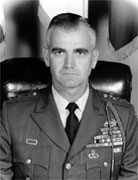Gen. W. C. Westmoreland

U.S. Army Chief of Staff
William Childs Westmoreland was born in Spartanburg County, South Carolina, on 26 March 1914; graduated from the United States Military Academy, 1936; was commissioned a second lieutenant, June 1936, and served with the 18th Field Artillery at Fort Sill, 1936-1939; was promoted to first lieutenant, June 1939; was a battery officer and commander and a battalion staff officer of the 8th Field Artillery at Schofield Barracks, 1939-1941; was promoted to temporary major (February) and lieutenant colonel (September), 1942; was operations officer of the 34th Field Artillery Battalion, 9th Infantry Division, in the United States and North Africa and a battalion commander in operations in Tunisia and Sicily, 1942-1944; was executive officer of the 9th Division Artillery in Western European operations, 1944; was promoted to temporary colonel, July 1944; was chief of staff of the 9th Infantry Division in the closing operations of World War II in Germany, 1944-1945; commanded the 60th Infantry, 1945-1946; was promoted to permanent captain, June 1946; was chief of staff and later commander of the 71st Infantry Division, 1946; received airborne training at the Infantry School, 1946; commanded the 504th Parachute Infantry, 82d Airborne Division, 1946-1947; married Katherine S. Van Deusen, 1947; was chief of staff of the 82d Airborne Division at Fort Bragg, 1947-1950, receiving his promotion to permanent major in July 1948; was instructor at the Command and General Staff College at Fort Leavenworth, 1950-1951, and the Army War College, 1951-1952; commanded the 187th Airborne Regimental Combat Team in operations in Korea, 1952-1953; was promoted to temporary brigadier general, November 1952, and permanent lieutenant colonel, July 1953; was deputy assistant chief of staff, G-1, for manpower control, 1953-1955; attended the advanced management program at Harvard Business School, 1954; was secretary of the General Staff, 1955-1958; was promoted to temporary major general, December 1956; was commander of the 101st Airborne Division and Fort Campbell, 1958-1960; was superintendent of the United States Military Academy, 1960-1963; was promoted to permanent ranks of colonel, June 1961, and brigadier general, February 1963, and to temporary lieutenant general, July 1963; was commander of the Strategic Army Corps and XVIII Airborne Corps, 1963-1964; was successively deputy commander and acting commander of United States Military Assistance Command, Vietnam, 1964; was promoted to temporary general, August 1964, and permanent major general, August 1965; was commander of United States Military Assistance Command, Vietnam, and United States Army, Vietnam, at the peak of the Vietnam War, 1964-1968; was chief of staff of the United States Army, 3 July 1968-30 June 1972; supervised the Army's disengagement from Vietnam, the transition from the draft to an all-volunteer footing, and the employment of troops in a period of active civil disturbance; centered attention upon efforts to improve service life, officer professionalism, job attractiveness, and public understanding; retired from active service, July 1972.